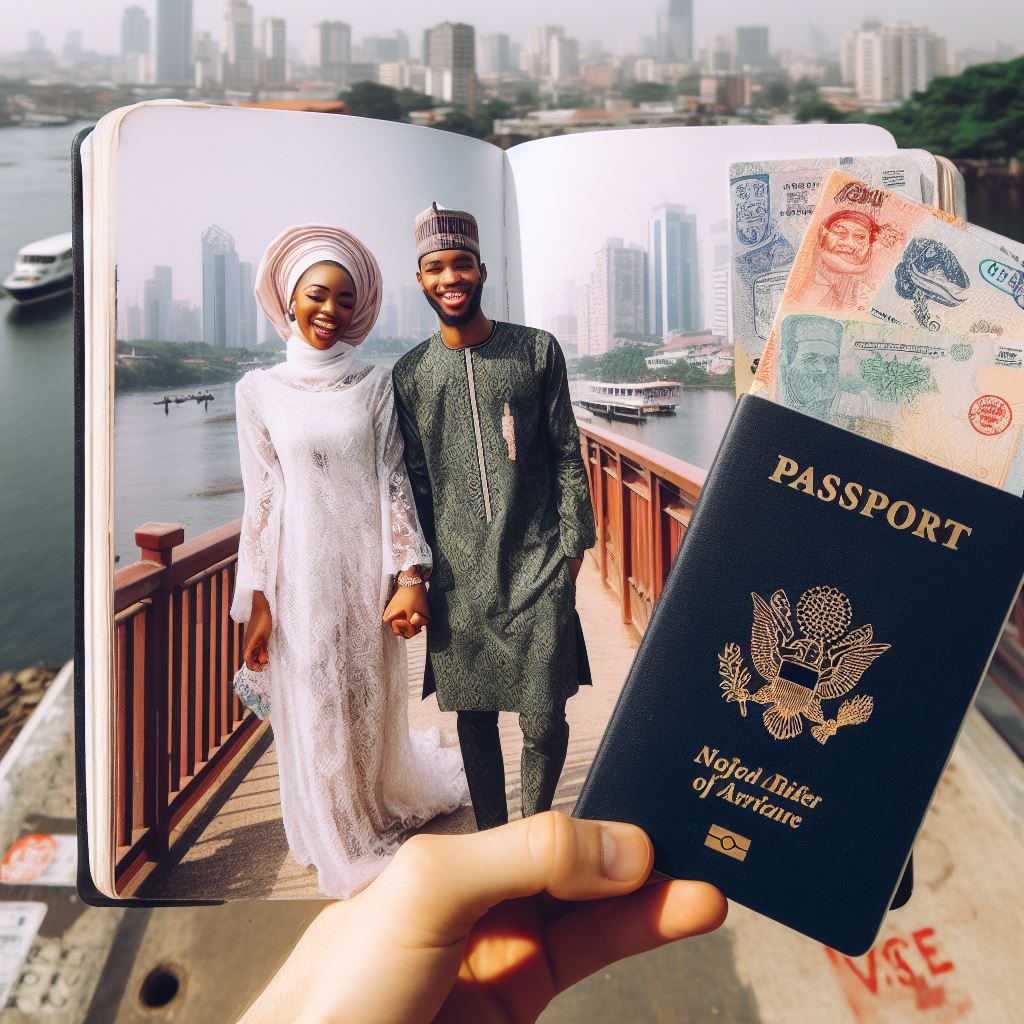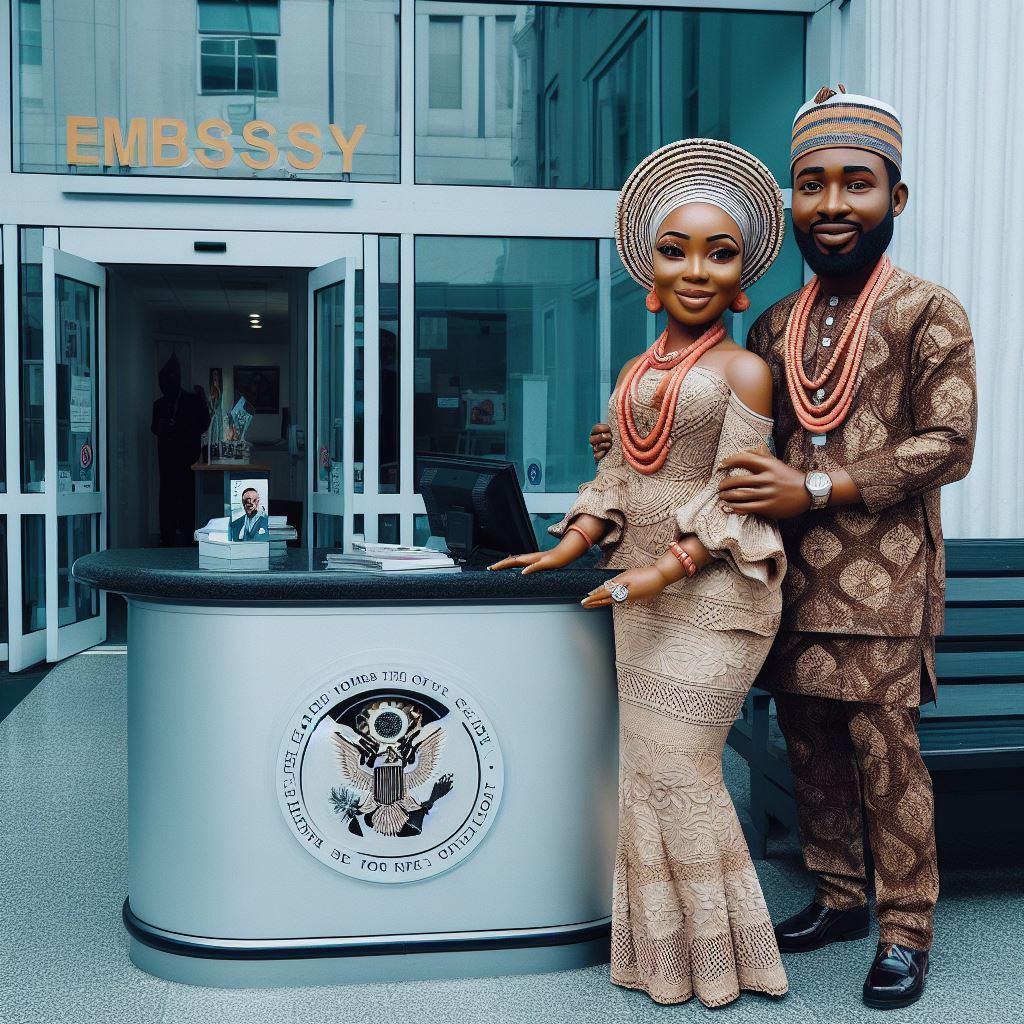Introduction
Applying for Nigerian citizenship by marriage is a significant and beneficial process.
Marriage offers individuals the opportunity to become Nigerian citizens and enjoy its privileges.
Embracing a new chapter in life through marriage is a profound milestone.
For those seeking to solidify their ties to Nigeria, the prospect of obtaining citizenship through this union is both a legal and emotional journey.
In this guide, we embark on a detailed exploration of the intricate process involved in applying for Nigerian citizenship through marriage.
From initial steps to finalization, we illuminate the essential stages and requirements, offering clarity and insight to those on this significant endeavor.
Join us as we unravel the steps that lead to a deeper connection with the vibrant culture, rich history, and warm embrace of Nigeria.
Requirements for Nigerian citizenship by marriage
Eligibility criteria for applying for Nigerian citizenship through marriage
- The applicant must be married to a Nigerian citizen.
- The marriage must be recognized as valid under Nigerian law.
- The applicant must have resided in Nigeria for a specific period of time.
Obtaining Nigerian citizenship through marriage has certain eligibility criteria that need to be fulfilled.
Firstly, the applicant must be married to a Nigerian citizen.
This ensures that the marriage is genuine and not for fraudulent purposes.
Secondly, it is crucial that the marriage is recognized as valid under Nigerian law.
This means that the marriage certificate must be duly registered with the appropriate Nigerian authorities.
This ensures that the marriage holds legal weight and is accepted as a basis for acquiring citizenship.
Furthermore, the applicant must have resided in Nigeria for a specific period of time.
This requirement varies depending on the circumstances, but generally, a minimum period of marriage is necessary before one can be eligible for Nigerian citizenship.
Importance of having a valid and recognized marriage in Nigeria
- A valid marriage is a fundamental requirement for acquiring Nigerian citizenship.
- Recognition of marriage under Nigerian law ensures legality and authenticity.
Holding a valid and recognized marriage in Nigeria is of utmost importance when applying for Nigerian citizenship.
This is because a valid marriage is considered a fundamental requirement for acquiring citizenship.
It signifies the commitment and bond between the applicant and the Nigerian citizen, making it an essential aspect of the naturalization process.
Furthermore, the recognition of marriage under Nigerian law ensures the legality and authenticity of the union.
By ensuring that the marriage is registered and recognized, the Nigerian government verifies the validity of the marriage and its suitability as a basis for granting citizenship.
Minimum period of marriage before applying for citizenship
A minimum period of marriage is required before one can apply for Nigerian citizenship.
Before applying for Nigerian citizenship, it is necessary for the applicant to have been married for a certain period of time.
This requirement aims to ensure that the marriage is stable, genuine, and not entered into solely for the purpose of acquiring citizenship.
Additional requirements
- Evidence of financial stability may be required.
- Knowledge of Nigerian culture and language may be necessary.
In addition to the basic eligibility criteria, there may be additional requirements for obtaining Nigerian citizenship by marriage.
These can include providing evidence of financial stability to demonstrate that the applicant will be able to support themselves and contribute positively to Nigerian society.
Additionally, knowledge of Nigerian culture and language may be necessary to showcase integration and the ability to adapt to the Nigerian way of life.
This requirement may be assessed through interviews or tests conducted by the Nigerian immigration authorities.
In short, acquiring Nigerian citizenship by marriage requires fulfilling specific requirements.
These include meeting the eligibility criteria, having a recognized and valid marriage, abiding by the minimum period of marriage, and potentially providing evidence of financial stability and knowledge of Nigerian culture and language.
Read: Requirements for Obtaining Citizenship through Marriage
Application process
Applying for Nigerian citizenship by marriage can be a complex process.
There are several steps involved, along with specific documentation required, such as marriage certificates, birth certificates, and passports.
Additionally, obtaining an immigrant visa or resident permit is necessary to reside in Nigeria during the application process.
The steps involved in applying for Nigerian citizenship by marriage
Let’s break down each step and requirement in detail:
Gather the necessary documentation
In order to apply for Nigerian citizenship by marriage, you will need to gather various documents.
These include:
- Your marriage certificate, which should be legally recognized in Nigeria.
- Birth certificates of both spouses to prove their identities.
- Valid passports for both spouses.
Obtain an immigrant visa or resident permit
Prior to beginning the application process, it is crucial to obtain either an immigrant visa or a resident permit.
This will allow you to legally reside in Nigeria during the application period.
Complete the application forms
Once you have gathered all the necessary documentation and obtained the required visa or permit, you will need to complete the application forms.
The forms can be obtained from the Nigerian Immigration Service or downloaded from their official website.
Submit the application
After completing the application forms, you will need to submit them, along with the required documentation, to the nearest Nigerian Immigration Service office.
Make sure to double-check that you have included all the necessary information and documents before submission.
Attend an interview
Once your application has been reviewed, you may be called for an interview at the Nigerian Immigration Service office.
This interview is meant to confirm the authenticity of your marriage and assess your eligibility for Nigerian citizenship.
Background checks and approval
During the application process, the Nigerian Immigration Service will conduct background checks on both spouses.
This is to ensure that there are no legal impediments or issues that could affect your eligibility for Nigerian citizenship.
If everything checks out, your application will be approved.
Oath of allegiance
Upon approval of your application, you will be required to take an oath of allegiance to Nigeria.
This oath signifies your commitment to the country and its laws, and marks the final step towards obtaining Nigerian citizenship.
Applying for Nigerian citizenship by marriage involves a series of steps that must be followed diligently.
From gathering the necessary documentation to attending interviews, the process requires attention to detail and adherence to the requirements set by the Nigerian Immigration Service.
By following these steps and providing all the required documentation, you can increase your chances of successfully obtaining Nigerian citizenship through marriage.
Read: Pros & Cons of Marriage-Based Citizenship in Nigeria
Timeline and waiting period
The average processing time for applications for Nigerian citizenship by marriage
The average processing time for applications for Nigerian citizenship by marriage can vary.
It typically takes around 2-4 months for the Nigerian government to process these applications.
Potential delays or factors that may prolong the waiting period
However, it is important to note that this timeline can be subjected to potential delays.
One of the factors that may prolong the waiting period is the submission of incomplete application documents.
In such cases, applicants may be required to provide additional information or correct any errors.
Another potential delay can occur due to the backlog of applications within the Nigerian immigration system.
High volumes of applications can lead to a longer waiting period as authorities work through the queue.
Changes in immigration policies or procedures can also impact the processing time.
Importance of patience during the application process
Patience is essential during the application process for Nigerian citizenship by marriage.
The process can be complex and time-consuming, so it is crucial to remain patient and avoid unnecessary stress.
Impatience can lead to mistakes or oversights in completing the application, potentially causing further delays.
It is important to carefully follow all instructions provided by the Nigerian immigration authorities.
Being patient allows time for thorough preparation, ensuring all necessary documents are gathered and submitted correctly.
Moreover, maintaining a positive attitude and patience throughout the waiting period can ease the overall experience.
Remember that the Nigerian government has its own process and timeline, which may not align with personal expectations.
Keeping calm and patient will help navigate any potential challenges or delays that may arise during the application process.
By understanding the timeline and the potential factors that may affect the waiting period, as well as embracing patience, individuals applying for Nigerian citizenship by marriage can approach the process with a realistic mindset.
It is crucial to prepare all necessary documents and provide accurate information to avoid unnecessary delays.
Patience will provide the stability needed to navigate through any unexpected obstacles, ultimately leading to a smoother application experience.
Read: Navigating Nigeria: Marriage Citizenship Laws Explained

Citizenship test and interview
When applying for Nigerian citizenship by marriage, there is a possibility of undergoing a citizenship test or interview as part of the application process.
This section will explain the purpose of these tests and interviews, discuss the types of questions or topics that may be covered, and provide tips for preparing for them.
Purpose of citizenship tests and interviews
The Nigerian government uses citizenship tests and interviews to assess the eligibility and suitability of individuals applying for citizenship by marriage.
These tests and interviews aim to ensure that the applicant has a genuine relationship with a Nigerian citizen and possesses adequate knowledge about Nigerian culture, values, and laws.
Types of questions or topics covered
The questions or topics covered in a Nigerian citizenship test or interview can vary, but they generally focus on the following areas:
- Nigerian history and culture: Applicants may be asked about important historical events, traditional customs, or cultural practices in Nigeria.
- Nigerian Constitution: Knowledge about the Nigerian Constitution is essential, including an understanding of the fundamental rights and responsibilities of Nigerian citizens.
- Nigerian government and politics: Basic knowledge of the Nigerian government structure, political system, and key figures may be assessed.
- Family and community: Questions about Nigerian family values, traditions, and social norms may be included.
- Spousal relationship: Applicants may need to demonstrate their knowledge of their Nigerian spouse’s personal background, family, and interests.
Tips for preparing for the interview or test
Preparing for a Nigerian citizenship interview or test can significantly increase your chances of success.
Here are some tips to help you:
- Study the Nigerian Constitution: Familiarize yourself with the Nigerian Constitution, especially the rights and responsibilities of citizens.
- Learn about Nigerian history and culture: Read books or articles, watch documentaries, and engage in conversations to enhance your knowledge about Nigeria’s history, traditions, and customs.
- Stay updated on Nigerian current affairs: Follow Nigerian news sources to be aware of ongoing events, political developments, and societal issues.
- Practice interview scenarios: Find sample citizenship interview questions online and practice answering them to build confidence.
- Seek assistance from Nigerian citizens: Talk to Nigerian friends, colleagues, or organizations to gain insights and perspectives on Nigerian culture, society, and governance.
Remember, the purpose of the citizenship test or interview is to ensure that you have a genuine connection to Nigeria and are committed to upholding the rights and responsibilities of a Nigerian citizen.
By adequately preparing for the test or interview, you can demonstrate your dedication and knowledge, ultimately increasing your chances of obtaining Nigerian citizenship through marriage.
Read: The Art of Compromise: Key for Successful Nigerian Marriages
Acquiring Nigerian Citizenship by Marriage
Obtaining Nigerian citizenship through marriage is an important milestone for individuals who have chosen to build their lives in Nigeria.
Once the citizenship is acquired, it comes with various rights and privileges, as well as certain obligations and responsibilities.
Rights and Privileges
- Right to Live and Work: Individuals who acquire Nigerian citizenship by marriage have the right to live and work in Nigeria without any restrictions.
- Right to Own Property: Nigerian citizens by marriage are allowed to own property, land, and real estate within the country.
- Access to Social Services: They are entitled to access social services such as education, healthcare, and welfare schemes provided by the Nigerian government.
- Right to Vote: Those who acquire Nigerian citizenship through marriage can exercise their right to vote in both local and national elections.
- Right to Start a Business: Nigerian citizens have the freedom to start and manage their own businesses in Nigeria.
Obligations and Responsibilities
Along with the rights and privileges, acquiring Nigerian citizenship by marriage also comes with certain obligations and responsibilities:
- Respect for Nigerian Laws: Nigerian citizens are obliged to respect and abide by all Nigerian laws.
- Payment of Taxes: Nigerian citizens have the responsibility to pay taxes on their income and properties as stipulated by the Nigerian tax laws.
- Contribution to Society: They are expected to contribute positively to the development and well-being of the Nigerian society.
- Supporting the Nigerian Economy: Nigerian citizens have a responsibility to support the Nigerian economy by spending and investing locally.
- Defending the Nation: In times of need, Nigerian citizens may be called upon to defend the nation and its interests.
Obtaining a Nigerian Passport and Relevant Documents
After acquiring Nigerian citizenship by marriage, individuals can apply for a Nigerian passport and other relevant documents to help establish their Nigerian identity.
Here is an overview of the process:
- Application: The applicant needs to complete the Nigerian passport application form and provide necessary documents.
- Submission: The application should be submitted to the nearest Nigerian Immigration Service office or embassy.
- Biometric Data: The applicant will be required to provide biometric data, including fingerprints and passport-sized photographs.
- Payment of Fees: Applicable fees for passport processing should be paid as per the instructions provided.
- Interview: In some cases, an interview may be conducted to verify the applicant’s identity and information provided.
- Collection: Once the application is processed, the applicant can collect the Nigerian passport within the designated timeframe.
Additionally, individuals may also need to obtain other relevant documents such as a National Identification Number (NIN) and a Nigerian Driver’s License to fully establish their Nigerian identity.
Acquiring Nigerian citizenship by marriage opens up a world of opportunities and responsibilities.
It grants individuals the chance to fully immerse themselves in Nigerian society while contributing to its growth and development.
Find Out More: Nigerian Celebrity Marriage Stories That Inspired Us
Conclusion
The process of applying for Nigerian citizenship by marriage can be a complex and lengthy one.
However, it offers several benefits, such as the ability to live and work in Nigeria without restrictions.
It is important to gather all the necessary documents and submit them accurately to ensure a smooth application process.
If you are considering applying for Nigerian citizenship through marriage, it is crucial to understand the requirements and follow the correct procedures.
Consulting with a legal expert or immigration specialist can greatly assist in navigating through the application process successfully.
It is essential to remain patient throughout the process, as it can take several months or even years to receive Nigerian citizenship by marriage.
Understanding the timeline and being prepared for potential delays is crucial to avoid frustration.
It is vital to keep in mind that the process may vary for each individual, and it is important to stay informed and up-to-date on any changes in the Nigerian immigration laws and regulations that may affect the application process.
Applying for Nigerian citizenship by marriage can open up new opportunities.
If applicable to your situation, thoroughly research the process and seek professional guidance to ensure a smooth and successful application.




